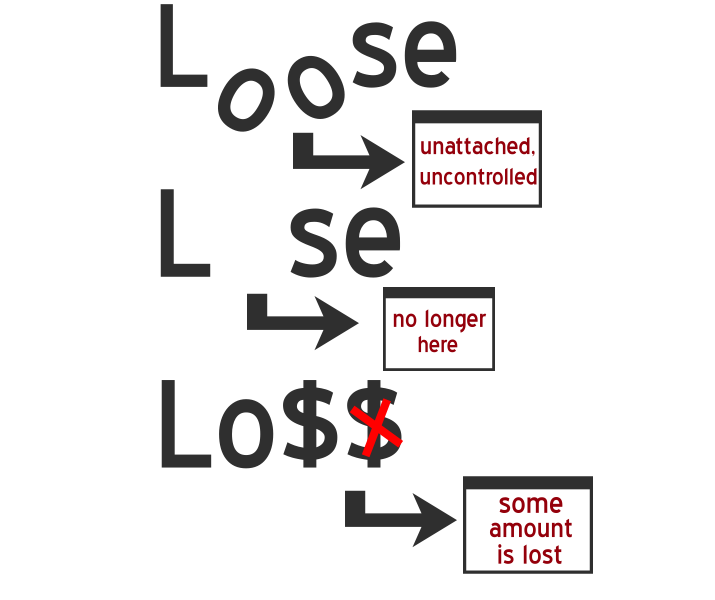In the English language, the terms "lost" and "loss" are often confused, but they have distinct meanings and uses. Understanding these differences is essential for effective communication, whether in writing or conversation. This article aims to delve deep into the definitions, uses, and examples of "lost" and "loss," providing clarity that can enhance your language skills.
We will explore various aspects of these terms, including their grammatical roles, common phrases associated with them, and how they are used in different contexts. By the end of this article, you will have a comprehensive understanding of "lost" vs "loss," empowering you to use these terms correctly in your daily interactions.
As we embark on this linguistic journey, it's crucial to emphasize the significance of language precision. Misusing terms can lead to misunderstandings, especially in professional or academic settings. Let’s dive into the world of "lost" and "loss" to clarify their differences and help you become a more effective communicator.
Table of Contents
- Definition of Lost and Loss
- Grammatical Roles of Lost and Loss
- Common Phrases and Usage
- Contextual Differences Between Lost and Loss
- Examples of Lost and Loss in Sentences
- Synonyms of Lost and Loss
- Conclusion
- References
Definition of Lost and Loss
The word "lost" is primarily an adjective or a verb in its past tense form. It describes a state of being unable to find something or being unable to keep possession of something. For example, if you misplaced your keys, you would say, "I lost my keys."
On the other hand, "loss" is a noun that refers to the state of losing something or someone. It encompasses the idea of deprivation or the experience of losing something valuable. For instance, one might say, "The loss of my grandmother was very painful."
Key Definitions
- Lost: (adjective/verb) Unable to find something or having misplaced it.
- Loss: (noun) The state of losing something or the experience of losing.
Grammatical Roles of Lost and Loss
Understanding the grammatical roles of "lost" and "loss" is essential for correct usage. "Lost" can function as both an adjective and the past participle form of the verb "lose." For example:
- Adjective: "I feel lost in this new city."
- Verb: "I lost my wallet yesterday."
In contrast, "loss" is strictly a noun and is often used in various contexts to describe an absence or deprivation. For example:
- "His loss was felt by everyone in the community."
- "The company reported a significant loss in revenue this quarter."
Common Phrases and Usage
Both "lost" and "loss" appear in several common phrases and idiomatic expressions. Familiarity with these phrases can aid in understanding and using these terms correctly.
Common Phrases with Lost
- Lost and found: A place where lost items are kept.
- Lost cause: A situation that is hopeless or cannot be changed.
- Lost in thought: Deeply absorbed in one's own thoughts.
Common Phrases with Loss
- Financial loss: A decrease in financial resources.
- Irrecoverable loss: A loss that cannot be regained.
- Loss of appetite: A decrease in the desire to eat.
Contextual Differences Between Lost and Loss
The context in which "lost" and "loss" are used can significantly alter their meaning. "Lost" often conveys a sense of confusion or disorientation, whereas "loss" typically refers to a more permanent state or consequence.
For instance, you might say, "I am lost in this unfamiliar neighborhood," indicating a temporary state. Conversely, when you mention, "The loss of trust in the organization has affected its reputation," it suggests a more lasting impact.
Examples of Lost and Loss in Sentences
Here are some practical examples to illustrate how "lost" and "loss" can be used in sentences:
Examples of Lost
- After hours of searching, I realized that I had lost my favorite book.
- During the hike, I felt lost when I strayed from the marked path.
Examples of Loss
- The sudden loss of a loved one can be devastating.
- The company's financial loss this year prompted a review of its spending habits.
Synonyms of Lost and Loss
Exploring synonyms can expand your vocabulary and provide alternative ways to express similar ideas.
Synonyms for Lost
- Misplaced
- Confused
- Adrift
Synonyms for Loss
- Deprivation
- Deficiency
- Setback
Conclusion
In summary, understanding the differences between "lost" and "loss" is crucial for effective communication. "Lost" relates to the state of being unable to find something, while "loss" refers to the condition of having lost something valuable. By familiarizing yourself with their definitions, grammatical roles, and common usages, you can enhance your language skills and avoid confusion in your conversations.
We encourage you to practice using these terms in your daily communication. If you found this article helpful, please leave a comment, share it with others, or explore more articles on our site.
References
- Cambridge Dictionary. (n.d.). Definition of lost. Retrieved from https://dictionary.cambridge.org
- Merriam-Webster. (n.d.). Definition of loss. Retrieved from https://www.merriam-webster.com
- Oxford English Dictionary. (n.d.). Lost vs loss. Retrieved from https://www.oed.com
Article Recommendations
- Shark Tank Greiner The Inspiring Journey Of Lori Greiner
- Exploring The Best Of Ashley Judd Movies A Journey Through Talent And Versatility
- Search Results For Tammy Bruces Wife


